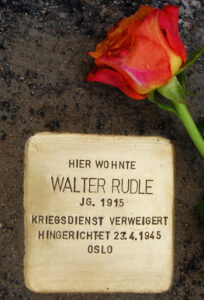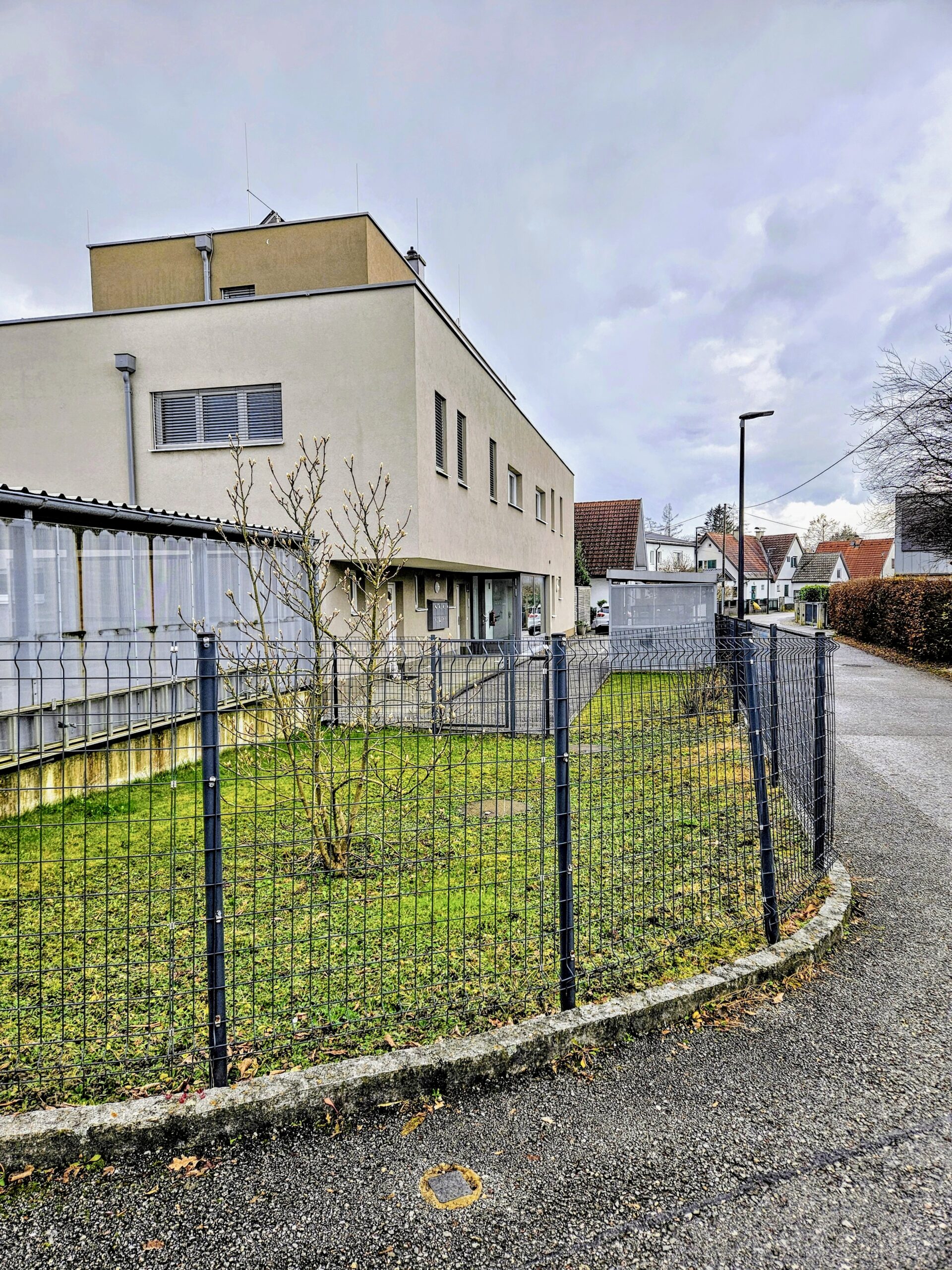Walter RUDLE was born in Bad Hofgastein (about 100 km south of Salzburg) on June 24, 1915. He was the youngest of the five children of the Catholic couple Amalie and Johann RUDLE.
His father worked as a clerk in the offices of the Salzburg state government and the family lived in the city of Salzburg, where they all had local citizenship rights. Walter graduated from the business secondary school in Salzburg, was an office worker in the labor office and had served in the Austrian army for about six months.
He married a 20 year old from the Austrian province of Carinthia and they had three children who were all born in Salzburg: Walter Jr. in November 1937 and the twins Gertrud and Edith in April 1939.
Walter RUDLE was 23 years old when he was drafted into the German army in the fall of 1938, but he was released on medical grounds (heart problems) after just a few weeks – according to the military doctors he was unfit for military service.
Later conscription check-ups came to the same conclusion. For a while RUDLE studied acting at the Vienna Academy for Music and Performing Arts and in the fall of 1939 he got a positon with the City Theater in Troppau in what was then the »Sudentenland Reichsgau« that had been carved out of the Czechoslovakian Republic by the Nazis [it is now the Czechoslovakian city of Opava].
In August 1940 he was engaged as an actor for a »Strength Through Joy« troupe in German occupied Norway. RUDLE stayed there during the war years and from January 1941 to April 1945 he was an announcer for the German »Oslo Soldiers Station«, the radio section of the German occupation authority.
Walter RUDLE’s boss was Dr. Hellmuth Habersbrunner, an »old fighter« who had participated in Hitler’s Beer Hall Putsch in 1923 and who made a successful career in the Nazi regime: first as director of the Munich radio station and finally as head of the radio section of the Norwegian occupation authority.
Although he was neither a Nazi party member nor a member of the SS, Walter RUDLE worked as a Nazi propagandist in Norway.
He was a civilian employee in one of those »indispensible« positions that protected privileged artists and others from military service until the last reserves were mobilized as the downfall of Nazi Germany approached.
The last thirteen days of the life in occupied Norway of the 29 year old Salzburger Walter RUDLE is documented in the extensive Police and Court file »StL. II Nr. 83/45« which can still be found in the Norwegian National Archives.
The files of the SS and Police Court North include the investigation reports and interrogation transcripts of the Secret Field Police section 629. Austrians may be annoyed to see that Walter RUDLE’s name was Germanized as »Walther Rüdle«.
The police records indicate that »Walther Rüdle« quit his job with the radio station on April 10, 1945 when he received his »marching orders« from the Salzburg military headquarters ordering him to report for active service.
The SS files also include an unused »third class Army railway ticket, RB No 793373, for one person and baggage from Oslo Salzburg«.
On April 12th, two days after the marching orders, RUDLE was arrested with his baggage in Lillestrøm (22 km outside of Oslo), along with a German stenographer named Hertha B. who was supposed to be his mistress.
He was interrogated in the German Army prison in Akershus and the secret police report says that they »were about to flee to Sweden«.
Evidence for this was an escape plan prepared by a Norwegian smuggler that Walter RUDLE had on him when he was arrested.
A striking aspect of the police evidence is that Norwegian smuggler isn’t identified even though the arrest took place only minutes before the couple was supposed to meet him in Lillestrøm. If, as we might suspect, the unidentified man was an undercover agent or a police informant then the lovers were lured into a secret police trap.
We know that the Secret Field Police had solid evidence in their hands and concluded that the couple’s flight was »a done deal«. And given the suitcases full of their personal effects they couldn’t deny their planned flight.
The attempted flight from Lillestrøm to neutral and unoccupied Sweden some 120 km away had fatal results for Walter RUDLE – who could be convicted of draft evasion even though was officially unfit for military service because of his heart problems (which had been noted in the April 10, 1945 »deployment appearance notice« from Salzburg Army headquarters).
The wartime crime of draft evasion took on a political dimension because of a negative evaluation from radio station director Dr. Habersbrunner when he said that Walther Rüdle [sic] had been careless in his work and had to be sharply reprimanded, so he could in no way be considered a convinced Nazi.
One of his co-workers reported having heard that Rüdle [sic] had said that because he was an Austrian not much could happen to him if the Allies took over Norway.
This denunciation opened RUDLE to the additional charge of »conspiracy to commit high treason«. But it seems that the because the Secret Field Police wasn’t a prosecuting authority and had no power to lodge criminal charges it simply recommended that RUDLE be tried for »undermining the military« according to § 5 of the »wartime criminal justice regulations«.
Both army courts-marshal and SS and Police courts were responsible for such cases. It is worth noting that the SS was extending its jurisdiction to civilians in its areas of operation and that the truth was the first victim of its arbitrary »justice«.
The search for an indictment would be fruitless. No written indictment existed because SS-Untersturmführer [2nd Lieutenant] Dr. Schmidt, the reserve SS judge serving as »representative of the prosecution« for the SS and Police Court North, presented only an oral indictment.
Dr. Schmidt asked that Walther Rüdle [sic] be sentenced to death for »draft evasion« and that all his civil and political rights be withdrawn for life.
The defendant had an SS judge as »ex officio defense councilor«, SS-Hauptsturmführer Nöthlichs who thought RUDLE was a weakling influenced by a woman.
Three SS and Police officers served as judges: SS-Obersturmbannführer [Lieutenant Colonel] Hans Latza as chief judge and chairman, SS-Hauptsturmführer [Captain] Görtz and Hauptmann [Captain] Dr. Bieber of the 27th SS-Police Regiment as co-judges.
Their verdict was preordained, as indicated by the fact that the entire process took only 65 minutes – each of which must have been terrifying for Walter RUDLE as a civilian who had to stand in front of three judges in SS uniforms. In a vain attempt to keep his neck out of the noose he succumbed to weakness at times – probably on the advice of his »ex-officio defense councilor«.
What was private shall remain private. What is worth noting is that Walter’s lover Hertha B. appeared in the process only as a witness. Contrary to the suggestion of Walter’s defense councilor the judge expressed the opinion that it was the woman who was influenced by the man and not vice versa.
On April 19, 1945 the SS court issued its »field-verdict« in Oslo. »In the name of the German People« the SS chief judge Hans Latza sentenced the »office worker Walther Rüdle« [sic] to death for »undermining military morale by evading the draft« and that all his civil and political rights should be withdrawn for life. This was followed by a judicial ruling that the verdict was not subject to appeal.
The fact that Walter RUDLE was sentenced to death for »undermining military morale« as an »office worker«, that is as a civilian and not a member of the military, made no difference.
For those convicted and jailed in the army prison at Akershus the only option left was to plead for mercy and to be sent to the front – a multi page appeal that showed that he couldn’t be a courageous hero.
On April 20, 1945, Adolf Hitler’s last birthday, the last word in the case was issued by three men who were near the end of their murderous careers: Hans Latza, the chief judge who had issued about 25 death sentences, SS-Obergruppenführer [General] and General of the Waffen-SS Wilhelm Rediess, the commander of all SS- and Police troops in Norway, and Josef Terboven, the Nazi governor for occupied Norway – three officials who would show Walter RUDLE no mercy and who even denied him a last visit with Miss Hertha B. Instead they ordered the immediate execution of the death sentence be carried out by a firing squad.
At 4 o’clock on the morning of April 23, 1945 an SS-Obersturmführer [1st Lieutenant] in the Akershus military prison had the task of transmitting their verdict to »Walther Rüdle« [sic].
RUDLE was given permission to write a letter. The presence of a priest was not recorded even though the court records clearly indicated that he was a Roman Catholic.
Around 10 minutes after 6 that morning the 29 year old Walter RUDLE was shot to death by an SS firing squad in the military prison near Oslo at Akershus.
The SS- and Police Court approved the burial of the body without indicating where it was to take place.
In the meantime it has been established that RUDLE was first buried, as was usual with »dishonorable« German soldiers, in the Grefsen churchyard, but that in the Fall of 1953 he was reburied in the German Soldiers’ Cemetery of Alfaset Krigskirkegård.
A report of his death was sent from Oslo to the »information center for war losses«, but it is unlikely that the SS and Police Court report dated April 30, 1945 ever reached its two addressees, the Chief prosecutor and the police administration in Salzburg.
The »war loss« – that is the judicial murder of Walter RUDLE in Oslo – was only recorded in the Salzburg police registration files in 1947 after an official report from Vienna with the notation: »Fell in Norway on 23/04/45 Death register 3261/47 Death Office 17 Amerlingstrasse, Vienna VI.«
It may be assumed that Walter RUDLE wrote letters to his loved ones in Salzburg during the last hours of his life, but even if they never got his letters his parents, siblings, wife and children certainly got the sad news. There is a death notice of the sort traditionally distributed to mourners at a funeral that says:
In Christian commemoration of our dearly loved son and father, brother, brother-in-law, and uncle, Herr Walter C. P. Rudle […] A few days before the German surrender he was sentenced to death by an SS Court and on April 23, 1945 he was shot.
He was never able to see his beloved mountain homeland again. Honor to his memory!
Thanks are due to the Norwegian researcher Jomar Hønsi for his research in the Oslo National Archives.
Sources
- Salzburg city and state archives
- Riksarkivet (National archives) Oslo: Judicial file StL. II Nr. 83/45 of the SS- and Police Court North
Research: Jomar Hønsi
Translation: Stan Nadel
Stumbling Stone
Laid 18.08.2016 at Salzburg, Chiemgaustraße 7



